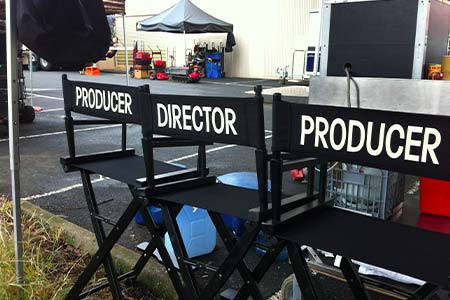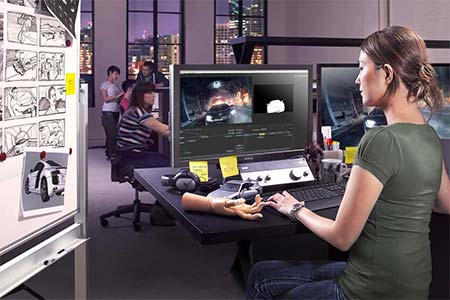Film making is one of the best industries where the best talents are groomed. Filmmaking is an industry where creativity plays an important role. The industry offers a wide variety of job roles. In this article we like to discuss some of the best jobs that offer good career growth for B.Sc Digital Filmmaking students.
Let’s discuss them in brief
1. Film Director
As a film director one is responsible to direct the films with his successful career in experience, producing quality work and building a positive industry reputation. As a film director he/she should be creative and should develop quality content for the audience
Role of a Film Director
Film Directors are integral part to the success of any film project. As a film director one will have to contribute to all the creative elements of a production. He/she is also responsible to shape all the elements to create a cohesive film. The film directors are required to have a strong creative vision and the ability to communicate the ideas to a variety of people throughout the production process.
Responsibilities of a Film Director
As a Film director one is needed to:
- He/she is responsible to read scripts
- Work with writers and provide feedback on the further development of scripts
- Select actors- sometimes working with casting directors and producers during the selection process
- Monitor rehearsals
- Direct actors during the filming
- Hold meetings with key departments such as the camera art and costume departments during the planning stages and throughout the filming
- Agree the budget and schedule of the film with the producer
- Be responsible for staying on budget and schedule
- Supervise all creative aspects of the production
- Work with the editor to present the final version of film
- Select music for the final film and work with composers to decide on the musical score
- Build and develop a network of contacts including writers, producers, film festivals and several public funding bodies
- Be updated with the latest knowledge of the industry
Key skills required to be a Film Director
As a Film Director one has to show:
- Creative flair
- Initiative and problem-solving ability
- Excellent communication
- Diplomacy and sensitivity
- Motivational and leadership skills
- The ability to work under pressure
- Excellent time management
- Attention to detail
2. Broadcast Presenter
As a Broadcast presenter one will work in highly competitive industries such as television and radio presenters. He/she is responsible for creating quality content that can reach the audiences in large numbers.
Role of a Broadcast Presenter
A Broadcast Presenter is the face or voice of programmes, broadcasts via television, radio and the internet. As a broadcast manager one will work on a variety of platforms, including national, regional, satellite and cable television, local and national radio and online platforms. The role of the broadcast presenter is to entertain and inform the audience by presenting information in an accessible and attractive way.
Responsibilities of a Broadcast Presenter
As a Broadcast presenter one is needed to:
- Research topics and background information for items to be featured on the programme
- Plan and rehearse shoes
- Create attractive scripts and present them to audiences
- Coordinate with other members of the production and technical teams
- Introduce and host programmes
- Read short news, traffic, sports or weather reports
- Keep the programming running to schedule, responding positively and quickly to problems or changes and improvising where necessary
- Meet with the production crew to assess or review a broadcast and to plan the next one
Skills Required for a Broadcast Presenter
As a Broadcast presenter one is required to have the following skillsets like:
- Excellent communication and presentation skills
- Performance skills and a clear voice
- The ability to generate original ideas
- A personable and confident manner
- A broad range of interests, including current affairs
- Good research and interviewing skills
- The confidence and ability to handle critical situations
- Should have an awareness of media rules and regulations
- Team working skills
- Creativity and problem-solving skills
3. Film Editor
As a film editor one is responsible to assemble recorded raw material and develop it into a finished product that’s suitable for broadcasting. The film editor is a person who gives a final shape to a film by gathering all the parts of the film and giving it a logical ending.
Role of the Film Editor
The film editor plays a crucial role in converting a raw material into a finished quality product. The editor is responsible to take the raw contents like camera footages, dialogue, sound effects graphics and special effects and integrate them to create a meaningful and highest quality content that keeps the audience engaged.
Responsibilities of a Film Editor
As a Film Editor one is responsible for:
- Receiving briefing or an outline of the footage, script or screenplay from the director
- Assembling all the raw footages with camera shots either recorded or transferred onto video tape in preparation for inputting into the computer
- Digitally cutting files to put together the sequence of the film and deciding what’s usable
- Creating a ‘rough cut’ of the programme and determining the exact cutting for the next and final stages
- Reordering and fine-tuning the content to ensure the logical sequencing and smooth running of the film
- Oversee the quality and progress of audio and video engineering and editing
- Experimenting with styles and techniques including the design of graphic elements
- Be updated with latest knowledge and technologies available in the editing field
Skills required to be a Film Editor
As a Film Editor one should have the following skill sets:
- A keen eye for detail and a critical mind
- Creativity and passionate interest in film and video editing
- Patience and concentration
- The ability to listen to others and to work well as part of a team
- A high-level of self-motivation, commitment and dedication
- Organisational and time management skills
- The ability to work under pressure and to deadlines
- Excellent communication skills both written and oral
4. Arts Administrator
The arts administrator plays an important part in the development of new projects, making arrangements for tours and events and taking on marketing and planning responsibilities in the film industry.
Role of an Arts Administrator
As an Arts Administrator one is responsible to manage activities and projects provided by a range of organisations in the arts sector that are related to films and plays. The arts administrators are responsible to facilitate the work of an artist and art programmes such as:
- Arts festivals and centres
- Community and disability arts organisations
- Dance companies
- Local authorities and arts councils
- Theatres, galleries and museums
Responsibilities of an Arts Administrator
As an Arts Administrator one is needed to:
- Plan and organise logistics relating to events, buildings, performers and other personnel
- Work to secure funding for venues or specific events
- Write and contribute to publications that accompany events and activities
- Arrange venues security catering and sale of tickets
- Handle the programming for events including booking performances and making arrangements for tours
- Promote performances and events through social media and direct mail, advertising, websites, posters or publicity leaflets and attract media coverage
- Plan and manage budgets
- Develop new projects and initiatives in consultation with arts professionals and key stakeholders
- Carry out strategic planning and make managerial decisions
Skills required for an Arts Administrator
As an arts administrator one is required to have the following skill sets:
- Good communications, teamwork, interpersonal and organisational skills
- Knowledge of and an interest in arts
- Ability to work independently, meet deadlines and manage a number of projects at the same time with accuracy
- Awareness of the specific arts activities and events in the area of expertise
- Administrative skills and experience of working to budgets
Salary & Emoluments
- A fresh B.Sc Digital Filmmaking student will be earning about 4 lakhs to 6 lakhs per annum.
- The experienced professionals will be earning about 6 lakhs to 8 lakhs per annum
Conclusion
The demand for the talented B.Sc Digital Filmmaking students are increasing day by day. The need for the best quality content has created more scope for the creative and talented B.Sc Digital Filmmaking professionals. The students who are passionate about filmmaking can join the B.Sc Digital Film Making course and earn a decent salary.






